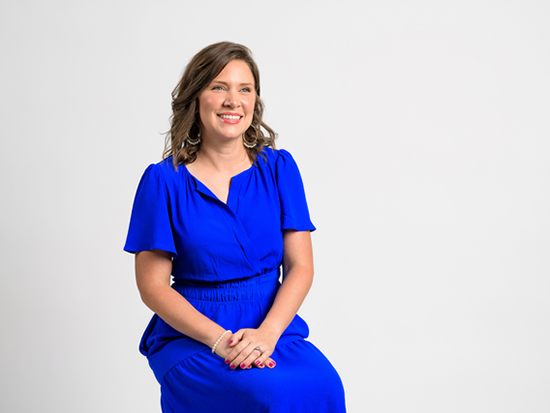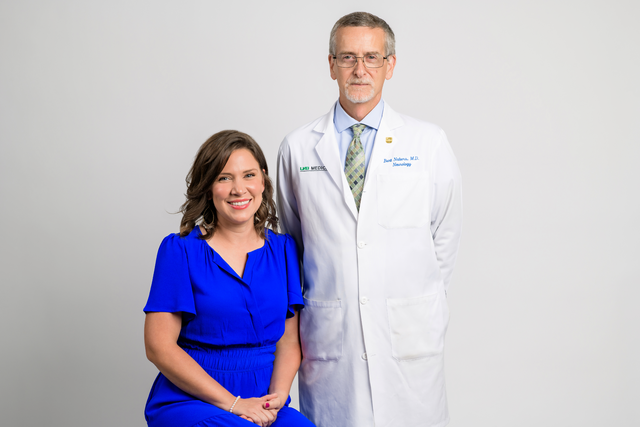Media contact: Brianna Hoge
 Shortly before her 34th birthday, Stephanie King was diagnosed with a grade 2 astrocytoma tumor (glioma) in her right temporal lobe.When Stephanie King was offered the opportunity to participate in a clinical trial at the University of Alabama at Birmingham’s O’Neal Comprehensive Cancer Center to treat her brain tumor, she envisioned the worst.
Shortly before her 34th birthday, Stephanie King was diagnosed with a grade 2 astrocytoma tumor (glioma) in her right temporal lobe.When Stephanie King was offered the opportunity to participate in a clinical trial at the University of Alabama at Birmingham’s O’Neal Comprehensive Cancer Center to treat her brain tumor, she envisioned the worst.
“I thought I was going to be someone’s lab rat,” King said. “It was a little scary to think that this is untested and they don’t know if it’s going to work. But everything up to that point had been scary. When they tell you that you have a brain tumor, it feels like your whole world has been pulled from under you. It’s the scariest of scary. I was thinking that my kids aren’t going to have a mom and my husband will be a widower.”
Shortly before her 34th birthday, King was diagnosed with a grade 2 astrocytoma tumor (glioma) in her right temporal lobe. According to the National Brain Tumor Society, it is the second leading cause of cancer deaths among young people. A surgery late in 2019 shrank the tumor, but it could not be removed without cutting out part of her brain.
At that point, UAB Medicine neuro-oncologist Burt Nabors, M.D., told King the best option would be to wait to see if the tumor began to grow again before diving into chemotherapy and radiation. If nothing changed after a year, she could begin the clinical trial, a study involving an isocitrate dehydrogenase inhibitor taken as a daily oral therapy.
Watch Stephanie’s story, here.
“There was no reason not to try it, because if we were going to watch and wait anyway, at least I could watch and wait while still trying something,” King said.
In this trial, half of the participants received a placebo. If their tumor began to grow, however, they would be given the option to switch to the actual drug. That is what happened to King. She began active treatment in 2022. Since then, the tumor has stopped growing, and her most recent MRI showed slight shrinkage.
“She now has a controlled disease,” said Nabors, the inaugural holder of the William Austin Brown Endowed Professorship for Brain Cancer Research. “It may not make the tumor go away, but the goal is to keep it from growing.”
Nabors says the results of the study were published in The New England Journal of Medicine in June 2023 and were fairly dramatic. Those who received the drug had a significant delay in the need to go on to additional treatment.
 King with Burt Nabors, M.D.“Stephanie has done a lot to advance the care for brain cancer patients, because this drug will hopefully be FDA-approved and available to everybody,” Nabors said. “It was a very impactful study, one of the most impactful in my career. It will change the way we treat patients in their 20s to 40s who have this cancer.”
King with Burt Nabors, M.D.“Stephanie has done a lot to advance the care for brain cancer patients, because this drug will hopefully be FDA-approved and available to everybody,” Nabors said. “It was a very impactful study, one of the most impactful in my career. It will change the way we treat patients in their 20s to 40s who have this cancer.”
King appreciates the broader impact of the trial, but she is overjoyed by what the results have meant for her personally.
“I’m so grateful for this trial — my life would be so different without it,” King said. “I can live a normal life. Nothing about me screams that I have cancer. I wouldn’t even know, except for the fact that I know. Other than that, I’m perfectly normal and healthy and have no complications.”